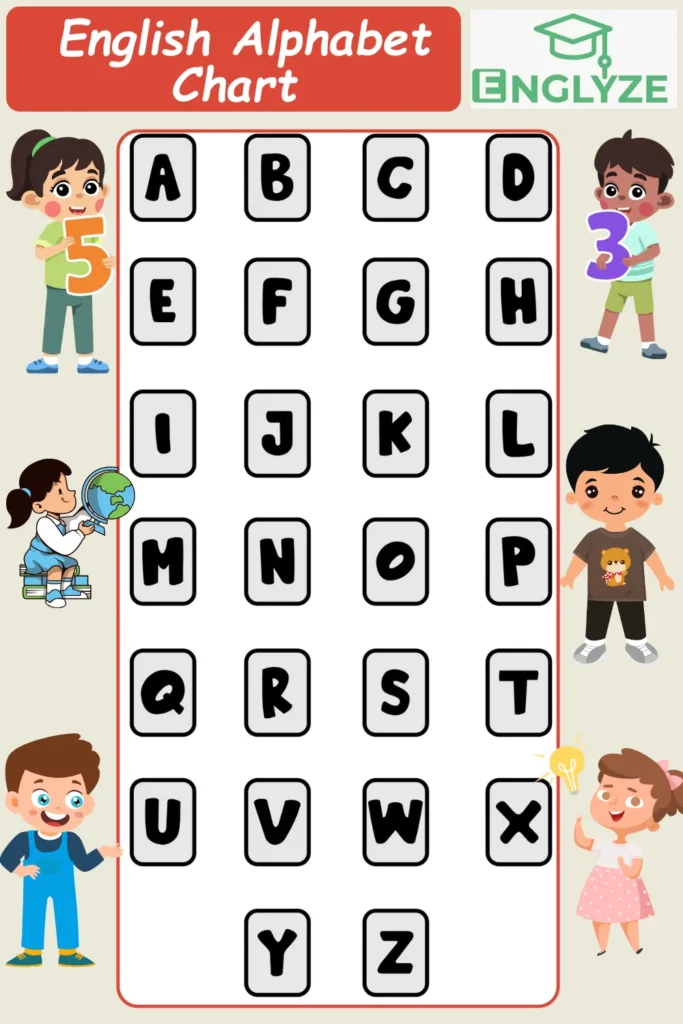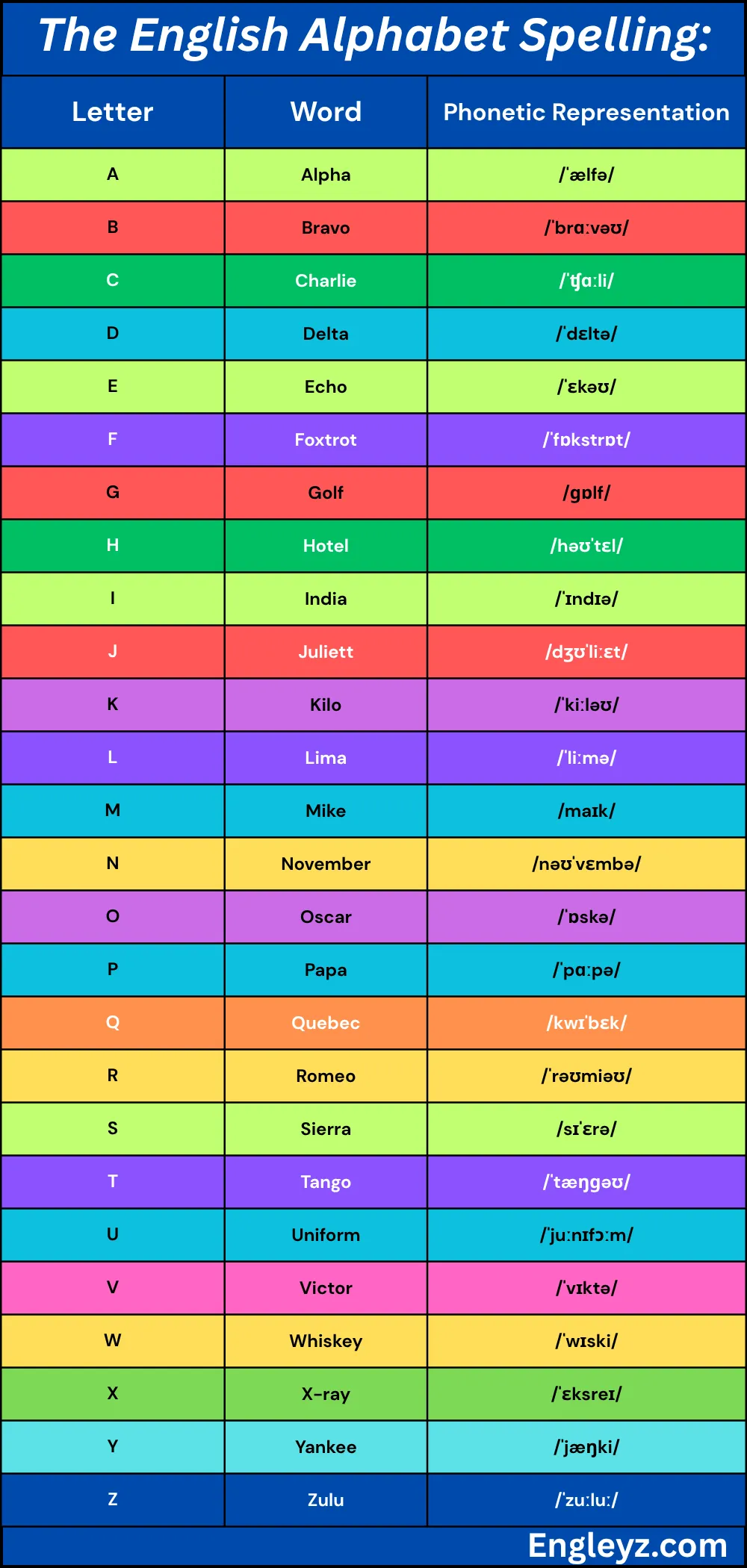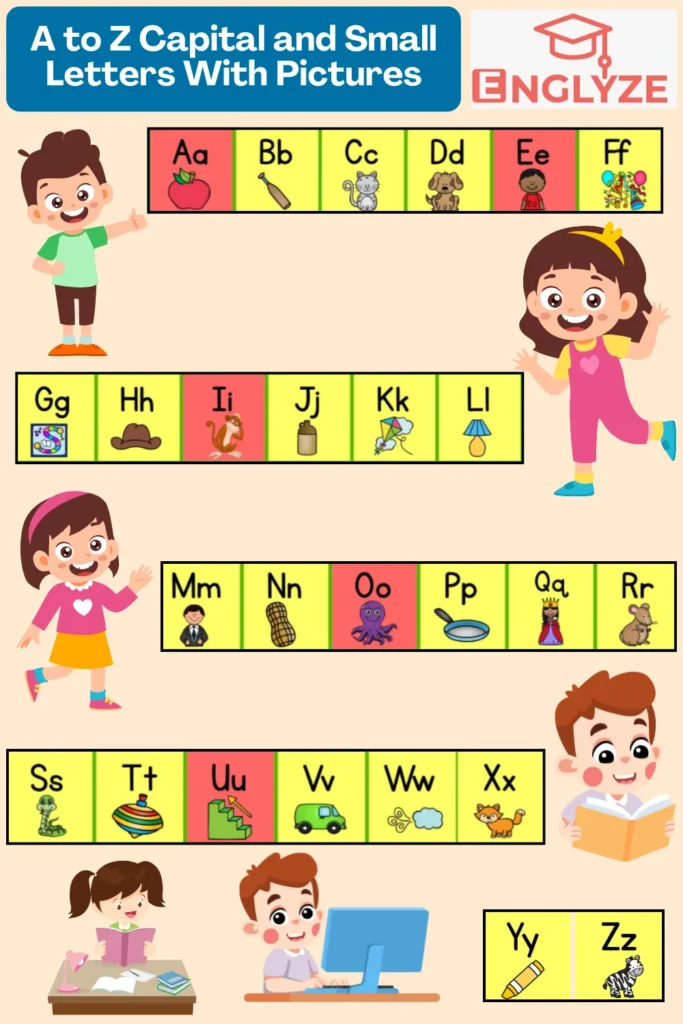Spelling out words clearly is crucial in many situations, whether it’s over the phone, in a noisy environment, or when clarity is essential. One of the most effective tools for achieving this is the English alphabet spelling system, often referred to as the phonetic alphabet or NATO phonetic alphabet. This system helps avoid confusion when communicating important details such as names, addresses, and codes.
In this guide, we’ll explore the English alphabet spelling system, explain its usage, and provide you with tips to master it. By the end, you’ll understand how to spell out words with confidence and clarity, making communication easier and more precise.

What is the English Alphabet Spelling?
The English alphabet spelling system is a set of words used to represent each letter of the English alphabet. These words are chosen for their distinct sounds, making it easier to understand letters when speaking over the phone or in other environments where clarity is needed.
The system uses words like Alpha for ‘A’, Bravo for ‘B’, and Charlie for ‘C’, which are often associated with the NATO phonetic alphabet. While commonly used in military and police communications, this system is also useful in everyday situations such as spelling out a name or an address. This allows the listener to distinguish between similar-sounding letters like ‘M’ and ‘N’ or ‘C’ and ‘T’.

The English Alphabet Spelling: Complete Breakdown
Here’s a breakdown of the English alphabet spelling system, including each letter, its corresponding word, and its phonetic representation:
| Letter | Word | Phonetic Representation |
|---|---|---|
| A | Alpha | /ˈælfə/ |
| B | Bravo | /ˈbrɑːvəʊ/ |
| C | Charlie | /ˈʧɑːli/ |
| D | Delta | /ˈdɛltə/ |
| E | Echo | /ˈɛkəʊ/ |
| F | Foxtrot | /ˈfɒkstrɒt/ |
| G | Golf | /ɡɒlf/ |
| H | Hotel | /həʊˈtɛl/ |
| I | India | /ˈɪndɪə/ |
| J | Juliett | /dʒʊˈliːɛt/ |
| K | Kilo | /ˈkiːləʊ/ |
| L | Lima | /ˈliːmə/ |
| M | Mike | /maɪk/ |
| N | November | /nəʊˈvɛmbə/ |
| O | Oscar | /ˈɒskə/ |
| P | Papa | /ˈpɑːpə/ |
| Q | Quebec | /kwɪˈbɛk/ |
| R | Romeo | /ˈrəʊmiəʊ/ |
| S | Sierra | /sɪˈɛrə/ |
| T | Tango | /ˈtæŋɡəʊ/ |
| U | Uniform | /ˈjuːnɪfɔːm/ |
| V | Victor | /ˈvɪktə/ |
| W | Whiskey | /ˈwɪski/ |
| X | X-ray | /ˈɛksreɪ/ |
| Y | Yankee | /ˈjæŋki/ |
| Z | Zulu | /ˈzuːluː/ |
This system was originally developed to help individuals pronounce letters clearly when communicating over radio, telephone, or other telecommunication devices. The words used are internationally recognized and standardized, which helps prevent misunderstandings.
Why is English Alphabet Spelling Important?
When you’re trying to communicate something like a name, address, or code, there’s a chance that similar-sounding letters could cause confusion. For example, “B” and “D” or “M” and “N” could be hard to distinguish, especially in noisy environments or over a bad connection.
Using the English alphabet spelling system, or phonetic alphabet, allows you to clearly communicate these letters. This becomes especially crucial in professional settings, such as aviation, military, emergency services, and customer service, where accuracy is essential.
Here are a few key reasons why you should learn the English alphabet spelling system:
-
Clarity: It eliminates the confusion between similar-sounding letters.
-
Accuracy: Ensures that information is correctly relayed, even in challenging conditions.
-
International Understanding: The words used in the system are universally recognized, making it effective in global communication.
-
Professionalism: Demonstrates proficiency in clear communication, which is especially important in business, security, and aviation.
How to Learn the English Alphabet Spelling System
Learning the English alphabet spelling system might seem daunting at first, but with a few steps, you’ll be spelling words clearly and confidently in no time. Here’s how you can get started:
-
Start with Your Name: Begin by spelling your own name using the phonetic alphabet. This will help you get familiar with the words and their sounds.
-
Use it in Daily Communication: The next time you need to spell something out—whether it’s a phone number, email address, or street name—use the English alphabet spelling system. With practice, you’ll be able to recall the words instantly.
-
Practice Commonly Used Words: Learn words or names that are commonly spelled out, like cities (e.g., Lima, Quebec) or first names (e.g., Mike, Charlie).
-
Group Similar Words Together: Some words in the phonetic alphabet have similar themes or associations, such as “Romeo” and “Juliet”, or “Foxtrot” and “Tango”. Grouping these words together can help you remember them better.
-
Listen to Real-life Examples: Pay attention to how the phonetic alphabet is used in radio communication or movies (e.g., in military or aviation scenes). Hearing it in context can help solidify your understanding.
Common Mistakes and How to Avoid Them
Although the English alphabet spelling system is quite straightforward, learners may still make mistakes. Here are a few common issues and tips on how to avoid them:
-
Confusing Phonetic Alphabet Words: Sometimes, similar-sounding words can be confused. For instance, “Tango” and “Tango” might sound the same, but practice will help you differentiate between them.
-
Mispronouncing the Words: Phonetic alphabet words must be pronounced correctly for clarity. Be sure to enunciate clearly and avoid mumbling the words.
-
Skipping Letters: Make sure to use the entire spelling system. Avoid skipping over letters, especially when spelling long names or words.
Advanced Tips for Mastering English Alphabet Spelling
Mastering the English alphabet spelling system requires practice, but there are a few advanced strategies that can help speed up the process and ensure accuracy. Let’s dive into some effective techniques to help you master the art of spelling with the phonetic alphabet.
1. Use Flashcards for Quick Recall
Flashcards are a tried-and-true method for learning and retaining information. To quickly memorize the English alphabet spelling words, create a set of flashcards with the letter on one side and the corresponding phonetic word on the other. Practice regularly by going through the cards, testing your recall speed, and challenging yourself to improve.
-
You can make your flashcards interactive by adding the phonetic representation on the reverse side.
-
Another option is to use digital flashcard apps, where you can practice anytime and track your progress.
2. Create Mnemonics or Associations
Mnemonics are memory aids that can help you associate the phonetic alphabet words with something easier to remember. For example, to remember “Foxtrot” for “F”, you might visualize a fox dancing (since “foxtrot” is also a dance).
The more creative and visual the association, the easier it will be to remember. You can also group letters based on themes (e.g., “Charlie” and “Juliet” for names, or “Whiskey” and “Victor” for similar-sounding words).
3. Practice in Context
Instead of just learning the alphabet in isolation, use it in everyday situations. For example:
-
Spelling your address over the phone: When talking to a customer service representative or making a reservation, practice spelling out your address, email, or name with the phonetic alphabet.
-
Online games or apps: Use apps that simulate real-world situations where you need to spell things out clearly and quickly. This could include spelling games or phonetic alphabet quizzes.
The key is to use the English alphabet spelling system actively in real conversations. Over time, it will become second nature.
4. Record Yourself
Recording yourself spelling out words can be an incredibly effective method for improving pronunciation and fluency. By listening to yourself, you can identify any mistakes or areas for improvement. This will also help you fine-tune your pronunciation of the phonetic alphabet words.
You could try recording short sentences, such as spelling out your name or a message. Play it back to assess your speed and accuracy, making adjustments where needed.
5. Listen and Repeat from Authentic Sources
A great way to reinforce your understanding of the English alphabet spelling system is by listening to how it’s used in real-life contexts. Look for videos, podcasts, or radio stations where the phonetic alphabet is used regularly. This is especially useful in aviation or military communication channels.
Pay attention to how the words are spoken and mimic the pronunciation. Over time, you’ll naturally adopt the correct cadence and intonation.

Applications of the English Alphabet Spelling System
The English alphabet spelling system is useful in more than just everyday communication. It’s crucial in various professional sectors where precision is paramount. Below, we’ll take a look at some of the key applications of the phonetic alphabet and why it’s so essential in these fields.
1. Aviation
In aviation, clear communication is critical for safety. The English alphabet spelling system ensures that pilots, air traffic controllers, and ground crew can communicate important information, like flight numbers, locations, and instructions, without misunderstandings.
For example, a pilot might say: “Delta 123, hold at Lima.” In this case, “Delta” refers to the letter D, and “Lima” refers to the letter L. This system helps prevent miscommunication, which could have severe consequences in aviation.
2. Military and Emergency Services
The English alphabet spelling system is widely used by military personnel and emergency services to communicate over radio or telephone in noisy environments. The need for precision in these fields cannot be overstated. Spelling out a call sign or a location using the phonetic alphabet eliminates the risk of errors during critical communication.
3. Customer Service
In customer service, particularly when speaking over the phone, representatives often need to clarify email addresses, names, or order numbers. Using the English alphabet spelling system ensures that both the customer and the representative understand each other clearly, even if there’s a poor connection or background noise.
4. International Communication
The English alphabet spelling system is a universal standard, meaning it’s recognized globally. This makes it invaluable for international communication. Whether you’re dealing with cross-border business transactions or coordinating logistics, the ability to use the phonetic alphabet ensures that your message is understood accurately, no matter where in the world you’re speaking.
Troubleshooting Common Challenges in English Alphabet Spelling
While learning the English alphabet spelling system is straightforward, there are a few common challenges learners face. Let’s take a look at these challenges and how to overcome them.
1. Difficulty with Similar-Sounding Words
It’s easy to confuse similar-sounding words like “Sierra” and “Cierra”. While both are part of the system, it’s essential to familiarize yourself with the distinctions.
-
Tip: Group the similar-sounding words together, such as “Mike”, “November”, and “Victor”, to help reinforce the differences in pronunciation and context.
2. Getting Stuck on Certain Letters
Some letters in the phonetic alphabet might seem harder to remember, such as “Quebec” for Q or “Yankee” for Y. These are less commonly used in everyday speech, so they may take more time to commit to memory.
-
Tip: Practice spelling out words using these letters frequently, or create associations that help you link the word to its letter. For example, think of “Quebec” as representing Q in Quebec, a Canadian province, which is a useful reference.
3. Pronunciation Challenges
Proper pronunciation is key to using the English alphabet spelling system effectively. If you have difficulty pronouncing certain words, consider listening to recordings of native speakers using the system. You can also use language apps that focus on pronunciation practice.
-
Tip: Don’t rush. Take your time to listen, repeat, and perfect each word’s pronunciation. Repetition will eventually make these words feel natural.
The Importance of Practice and Consistency
Mastering the English alphabet spelling system is all about consistent practice. Like any skill, the more you practice, the more natural it becomes. Even once you’ve learned the phonetic alphabet words, you’ll need to continue practicing to ensure that you use them correctly and confidently in real-world situations.
1. Daily Practice
Set aside a few minutes each day to practice the English alphabet spelling system. Try spelling different words aloud or with a partner to increase your fluency. This practice doesn’t have to be tedious – make it part of your daily routine, like spelling your name or address out loud while walking or driving.
2. Incorporate It into Your Environment
Another way to reinforce your learning is to incorporate the phonetic alphabet into your environment. For instance, label objects around your home with their corresponding phonetic alphabet word. For example, label your “keyboard” as “Kilo”, “India”, “Echo”, “Bravo”, “Oscar”, “Romeo”, “Delta”.
This can serve as a fun way to immerse yourself in the phonetic alphabet and make learning it feel more natural.
3. Challenge Yourself with Complex Spelling
As you grow more confident, challenge yourself with more complex words and phrases. Try spelling out longer names, email addresses, or even sentences using the English alphabet spelling system. The more you push your boundaries, the more fluent you’ll become.
Recap Why You Should Master the English Alphabet Spelling System
To recap, mastering the English alphabet spelling system offers a range of benefits:
-
Clear Communication: It helps prevent misunderstandings when spelling out important information, particularly in noisy environments or over the phone.
-
Professionalism: Whether in business, customer service, or the military, using the phonetic alphabet demonstrates your attention to detail and ability to communicate accurately.
-
Global Understanding: The phonetic alphabet is universally recognized, making it a critical tool in international communication.
By using consistent practice and the techniques outlined above, you’ll be well on your way to mastering the English alphabet spelling system. It will become an invaluable tool in your communication toolkit, ensuring clarity and precision every time you spell out important details.
Conclusion on English alphabet spelling
Mastering the English alphabet spelling system is not just about learning words; it’s about ensuring clear and accurate communication in every situation. Whether you’re working in a professional setting, communicating internationally, or just trying to spell your name over the phone, the phonetic alphabet is a powerful tool.
With practice, this system will become second nature, allowing you to spell words confidently and communicate with clarity in any environment. Start practicing today, and soon you’ll be spelling out names, addresses, and important details like a pro!